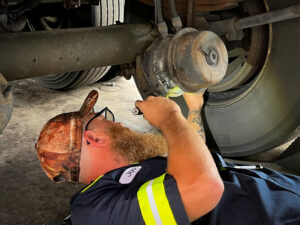Amerit blog

Building A PM Program That Prepares You For Anything
Building a PM Program that Prepares You For Anything What

Safety Tips for Your Fleet In Extreme Winter Weather
With extremely cold temperatures, there are numerous things your fleet

Seven Keys To Improving Uptime For Your Fleet
Now more than ever, trucking fleets are under pressure to

The Amerit Way: Customer-Focused Fleet Maintenance Programs
Our customer-focused fleet maintenance programs serve many of the largest

Advancing Zero Emission Vehicle Maintenance with Amerit’s Advanced Clean Fleet Mobile Service Centers
As the world’s focus on sustainability intensifies, commercial fleets across

Prioritizing Fleet Maintenance Service To Improve Uptime, Reduce Costs, and Increase Operational Efficiency
Prioritizing fleet maintenance service is critical to improving uptime, reducing

Eliminating Vehicle Downtime For Your Fleet
Eliminating vehicle downtime for your fleet can seem impossible, but

How to Convert Fleet Data Into Actionable Information
Fleet data is key to every aspect of fleet operations,

Reliable Fleet Services
What makes for reliable fleet services? We believe reliable fleet

Choosing the Right Fleet Service Provider for Your National Program
While the benefits of vendor consolidation can yield significant cost

How To Set Up a Fleet Maintenance Program
Every fleet manager knows the basic components of a fleet

Preparing Your Fleet for the Winter Months
Preparing your fleet for winter months takes resources, time, and

Improve Profitability – Attain Real ROI & Perform Under Budget Year Over Year
The Situation: Investment in New Technology Requires New Comprehensive Maintenance

Increasing Uptime Through Amerit’s Central Purchasing Team
We are all familiar with the problem – as the

Exploring Electric Vehicle Maintenance and Fleet Electrification
When it comes to understanding electric vehicle maintenance and fleet

10 Features of a Successful Fleet Maintenance Program
Every fleet has unique goals and needs, but there are

Last Mile Fleet Maintenance: 7 Keys to Success
Whether you’re considering adding last mile delivery services or are

Mobile Centers – Amerit’s Electric MSC
We have launched the next generation in mobile fleet maintenance
EVERYWHERE YOU NEED US
As the most trusted and respected team of fleet maintenance professionals in the country, we leverage our nationwide infrastructure to create maintenance service solutions wherever you need them.


